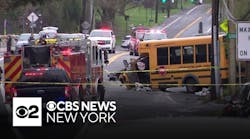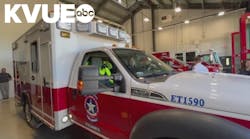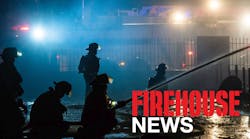When I learned in late October that the International Code Council (ICC) voted at its annual conference in Baltimore to keep residential sprinklers on the books despite strong opposition from the National Association of Home Builders, I could not help but think what the leaders of the home builders group were thinking. The conversation inside their cigar-smoke-filled offices at the home builders group might have gone something like this:
"Mr. Moneybags, we have bad news from Baltimore. The International Code Council voted 7–4 to keep residential sprinklers in the International Residential Code. This takes effect on Jan. 1, 2011, and requires sprinkler systems in new single-family homes after this date."
"What? How could this happen, Daddy Warbucks? You know how much money we've paid to fight this. We don't want residential sprinklers in the new building code for 2012. This is going to cut into our profits, deter people from building homes and make the cost of homes out of reach for first-time buyers."
"But Mr. Moneybags, there was stiff opposition from the fire service. They argued that residential sprinklers will save lives; hold down the loss on fire and might even save firefighters' lives. They had statistics that showed that about 79% of all people who die in fires die in their homes. The firefighters also have data that about 77% of all structure fires last year occurred in homes. Mr. Moneybags, it gets worse. Statistics demonstrate that there has never been any multiple loss of life in a fully sprinklered building. Property losses are 85% less in homes with fire sprinklers compared to those without sprinklers. The combination of automatic sprinklers and early-warning systems in all buildings and residences could reduce overall injuries, loss of life and property damage by at least 50%."
"Mr. Moneybags, the news out of Prince George's County in Maryland is not good either. Since they passed legislation in 1992 requiring sprinklers be installed in all one- and two-family homes, they have not had any fire deaths and only seven injuries in those homes, while 101 people have been killed and 334 were injured in non-sprinklered homes. The fire service has a strong case."
"Daddy Warbucks, I do not care what the fire service says. The members of our home builders association are suffering. We built so many homes and saturated the market with so many new subdivisions and homes over the last few years that there was a collapse of the housing market. We made a ton of money during that time, but now our members are feeling the pain. We must do everything we can to stop adding costs to building a home. This cuts into our profits."
"But Mr. Moneybags, the fire service estimates that adding a residential sprinkler to a new home only adds only about 1%-2% to the total cost of the home — about the same if they had added a Jacuzzi."
"Daddy Warbucks, that is ridiculous. Do you know what great vacations I could take with that extra 1%-2%?"
"Mr. Moneybags, I hate to be the bearer of more bad news, but there is plenty of proof that if sprinklers work in commercial buildings, they will also work in residential structures. Firefighters say many times when they arrive on the scene that the sprinkler has already put the fire out or controlled it enough that they can extinguish it very easily. Mr. Moneybags, don't you remember watching that video from The Station nightclub fire in Rhode Island in 2003 that killed 100 people? The U.S. Commerce Department's National Institute of Standards and Technology reconstructed the same type of room with the same materials and lit it on fire. In a little over two minutes, the choking smoke was near the floor. They then reconstructed a room the same way with sprinklers and the fire was extinguished before it could do any real damage."
"I could not care less about commercial buildings. We do not represent the commercial builders. I am only worried about our members. We must prepare for the next battle. We must take our fight to the counties and municipalities to keep fire sprinklers out of new homes!"
Although this is a fictitious conversation, and I believe in the American way of making a profit, I do not believe it should be at the expense of public safety or people's lives. Interestingly, there is an irony related to the fire service pushing for residential sprinklers. In the years to come, there will be fewer devastating fires in residential structures as older homes are torn down and replaced with new homes with fire sprinklers. There will be fewer injuries and deaths in residential fires. Politicians will look at these statistics and conclude that fewer firefighters and fire stations are needed. Little do the politicians realize that the number of firefighters and fire stations should never be based on run volume, but on risk. Fewer firefighters and fewer fire stations mean less capability to deal with risk.
However, when the politicians look at the statistics, they will see that fire service run numbers have edged up even more with EMS calls. Historians in the years to come will look at the inclusion of fire sprinklers for homes as a watershed moment for the fire service. Hopefully, they will also see the impact that home fire sprinklers have had in making the fire service even more of an EMS provider.
GARY LUDWIG, MS, EMT-P, a Firehouse® contributing editor, is a deputy fire chief with the Memphis, TN, Fire Department. He has 32 years of fire-rescue service experience. Ludwig is chairman of the EMS Section for the International Association of Fire Chiefs (IAFC), has a master's degree in business and management, and is a licensed paramedic. He is a frequent speaker at EMS and fire conferences nationally and internationally, and can be reached through his website at www.garyludwig.com.





